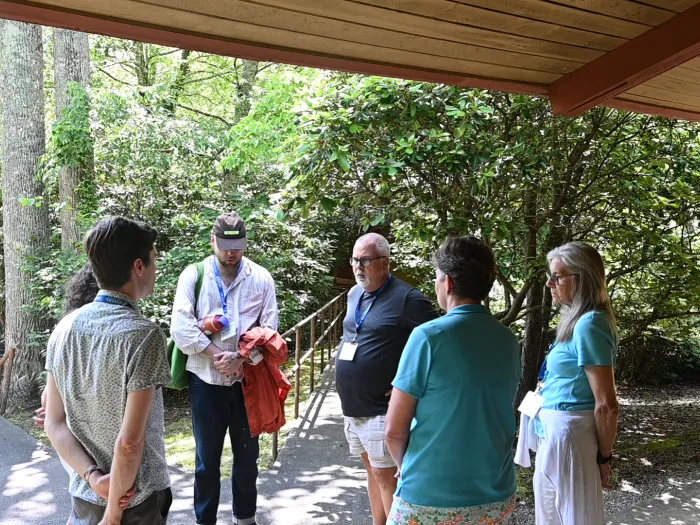Six Strings and the King
David LaMotte and Dr. Tom Trenney offer up a family concert at the Worship & Music Conference
MONTREAT, North Carolina — Whether they were playing separately or together, musicians David LaMotte and Dr. Tom Trenney wowed the Presbyterian Association of Musicians’ Worship & Music Conference crowd Monday night.

The two opened with “SS Bathtub,” a song LaMotte wrote for a decidedly younger crowd. Trenney accompanied him on piano. “There are a lot of serious musicians in the room, and so I need to apologize up front,” LaMotte said. “I did something you should never do: everything [in the song] rhymes with ‘ease.’”
Indeed, “Pekinese,” “knees” and “mac and cheese” all made it in, along with this thought: “I don’t use salt and I don’t use pepper, ‘cause I don’t want the whales to sneeze.”
LaMotte then performed five more original songs alone: “September Me,” “Grey Eagle,” “Keep the Change,” “Way It’s Done” and “Drink Deeply,” for which he traded in his guitar for a djembe.
He said he wrote “September Me” with the idea that “September” could be a verb: “September me like an old friend at the door” is one of the lyrics.

Grey Eagle was the original Cherokee name of Black Mountain, North Carolina, which LaMotte calls home. He said his parents met at Montreat Conference Center in 1955. His father was a desk clerk and his mother was the elevator operator. He finally worked up enough courage to ride the elevator, and three weeks later, he gave her his fraternity pin. Their romance lasted for seven decades; LaMotte’s mother died just a few weeks ago.
“Keep the Change” came from a time when LaMotte left a pick in his guitar strings and couldn’t figure out why it sounded like a kalimba when he played it. Since his parents had served a mission in Congo during the early 1960s, LaMotte fancied the kalimba sound. “I thought, I had a new instrument and I didn’t have to learn it,” he said. It’s the only song he’s ever written where the bridge is in a different key than the rest of the song.
“Way It’s Done” came from a camping trip LaMotte and his wife took with four other couples. Each night, a different couple made dinner for everybody. One night, LaMotte found himself in camp with the two cooks, who were bickering about the best way to cook their dish over an open fire. “These two who had stood up in front of God and pledged their love for one another both had strong feelings about how to prepare this meal for their friends,” LaMotte said, and he just had to write a song about “the stupid things that couples argue about.” When he used social media to help crowdsource people’s favorite dumb arguments among couples, more than 500 people had suggestions.
“This song isn’t about us,” LaMotte said. “It’s apparently about all of you.” Here’s the chorus: “You can do it all day long if you don’t mind doing it wrong.”

Trenney then took to the organ for “Carillon de Westminster” by Louis Vierne and J.S. Bach’s “Fugue in G Minor.”
Vierne, the organist at the Notre Dame Cathedral, wrote “Carillon de Westminster” after visiting Westminster Cathedral in London. “Organists approach this music with some trepidation,” Trenney said, because Vierne died on the organ bench at what became his last concert. “So wish me luck,” Trenney said.
For those who think Bach is boring, “try playing [Fugue in G Minor] sometime,” he recommended.
Trenney next recited three poems by Shel Silverstein: “Magic Carpet,” “Forgotten Language” and “Dancing Pants.” After each poem, Trenney improvised a brief organ piece. Years ago, Trenney’s parents would read Silverstein’s books to their son; now he reads them to his own children.

Trenney called his final offerings “Trio of Terrific Toe-Tapping Tunes”: Tchaikovsky’s “Dance of the Sugar Plum Fairy,” “Count Your Blessings” arranged by Dan Miller and “Everyone Dance” by Calvin Hampton.
The two musicians joined for one final number, “Shadows,” an instrumental LaMotte wrote about 25 years ago. LaMotte played his guitar on stage while Trenney joined him seated before the organ, which is in the center of Anderson Auditorium. They blended as if they were playing alongside one another.
The crowd stood and applauded after the final chord of the instrumental “Shadows.”
You may freely reuse and distribute this article in its entirety for non-commercial purposes in any medium. Please include author attribution, photography credits, and a link to the original article. This work is licensed under a Creative Commons Attribution-NonCommercial-NoDeratives 4.0 International License.




